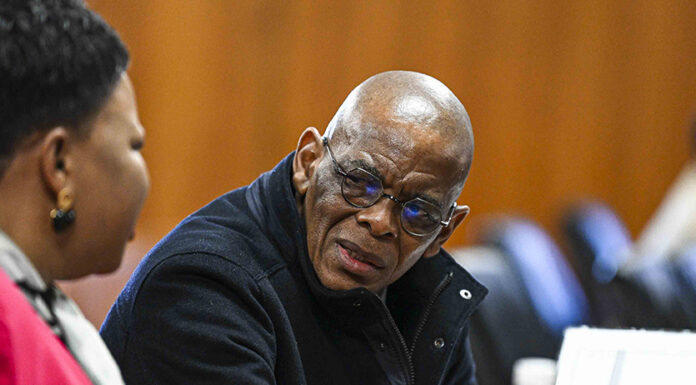The Constitutional Court stepped in as the National Prosecuting Authority (NPA) almost buried Ace Magashule’s ex-PA, Moroadi Cholota, under a mountain of legal paperwork by launching two identical appeals in the country’s highest courts.
The court’s intervention was a response to a letter Cholota’s lawyers wrote to Chief Justice Mandisa Maya on August 28, describing the NPA’s move as “a most egregious abuse of process”, and pointing out that it would cripple their client financially if she answered the same case simultaneously before the Supreme Court of Appeal (SCA) and the Constitutional Court.
“It is our humble submission, Chief Justice, that this is a most egregious abuse of process devoid of proper consideration for the ramifications (financial and otherwise) on Ms Cholota,” lawyer Piet Tibane protested.
It took acting registrar at the Constitutional Court Dunisani Mathiba to put an end to the farce, giving the NPA a deadline of three days, from September 9, to “make an election as to the forum for the case”. The matter was then set for the Constitutional Court.
The NPA is seeking to overturn the Free State High Court ruling in June that set Cholota free from criminal charges in the Free State government’s R255-million asbestos tender scandal, finding that her extradition from the US was unlawful.
But instead of picking one court to appeal to, the state prosecutors decided to hedge their bets.
On July 1, they filed an appeal with the SCA. Then, just two days later, they filed an almost identical application directly with the Constitutional Court.
The NPA tried to justify this double-filing with a bureaucratic shrug, saying it went to the SCA first to ensure compliance with the 30 days prescribed time frames for appeal, in the event that the ConCourt refused direct access.
For Cholota, this was not a procedural nuance but a nightmare.
Her lawyer, Tibane, spelt it out: “This effectively now means there are two identical appeal processes running concurrently and simultaneously.”
According to Tibane, what made the situation even more problematic was that the NPA failed to inform the SCA or its president about the parallel application to the Constitutional Court. The SCA, unaware of the parallel application, even granted the state leave to appeal on August 28.
The stage was set for a legal farce where the two highest courts could potentially issue conflicting rulings, creating chaos in the law.
But then, the Constitutional Court acted. On September 9, it issued a directive that forced the NPA to choose one forum.
On Thursday Cholota filed papers before the Constitutional Court, arguing that her extradition to the United States was not just a mistake but a violation of the law.
She focuses on the precedent known as the “Schultz Judgement”, handed down by the SCA in May 2024, saying it changed everything about how extraditions are supposed to work.
The SCA ruled that only the justice and correctional services minister can formally request extraditions.
Anything else, the court said, was unlawful.
For years, it seemed the NPA could act on behalf of the state to request extraditions. But the Schultz Judgement came along and changed that.



